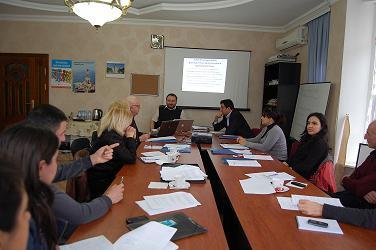The training was conducted on “Evidence Based Advocacy Strategy Training for Think Tanks”
Economic Research Center ( ERC) has conducted next training within the framework of “Enhancing the effectiveness of government by strengthening the role of think tanks in decision-making arena” project funded by European Union (EU) and in partnership with Policy Association for an Open Society ( PASOS) and “Intelligent Citizen” Enlightenment Center (ICEC).
The main aim of the project is to support partner think tanks to increase their knowledge and capacities in preparation and implementation of sound and effective advocacy policy.
The training was conducted by Piotr Kazmierkiewicz, analyst at the Institute of Public Affairs in Warsaw. P. Kazmierkiewicz is a political scientist, graduate of Southern Oregon University and Central European University. He was a consultant to European Commission, IOM, UNHCR and OSCE, carrying out gap analyses of Ukrainian and Azerbaijani laws and institutions in fields of visa and migration management.
The training was opened with delivery remarks by the chairman of ERC Management Board, GalibBayramov and there were representatives from 18 non-governmental organization representing Ganja, Shaki regions and Baku as well. The chairman highlighted that voice of independent think tanks in Azerbaijan is a very important issue in this field: “The delivery of outcomes of policy papers to relevant to the decision makers requires an effective and successful advocacy activities. Given this we decided to dedicate the topic of this training to evidence based advocacy strategy for think tanks”. Afterward, the chairman of ERC presented the trainer to attendees. According to him, this is the last 5th training dedicated to the institutional development of think tanks: “ The rest of the trainings will be directed to increasing of research opportunities of partner organizations”.
After a short speech of G.Bayramov the training was launched. On the first day of the training, the trainer discussed “Public policy process: theory and reality”, “Policymakers and independent advice” and “Planning advocacy efforts” modules. The second day of the training was dedicated to “March identifying policy problems and structuring arguments”, “Collecting evidence”, “Organizing findings into policy implications”, and “Structure of an effective policy brief. Choice between advocacy and objective briefs”, whereas as the last day of the training was talked about “March Delivering the message and providing follow-up”, “Developing recommendations and adapting the tone” and “Ensuring visibility and sustainability of advice”.
Meanwhile, the partner think tanks awarded with certificates for their participation at the institutional development trainings.
For more information, please contact to project coordinator DunyaCamalova.
